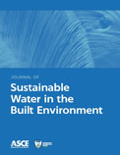
Journal of Sustainable Water in the Built Environment
Scope & Guideline
Cultivating collaboration for sustainable water practices.
Introduction
Aims and Scopes
- Sustainable Urban Water Management:
The journal prioritizes research on sustainable practices for managing water resources in urban areas, including stormwater management, wastewater treatment, and water reuse systems. - Green Infrastructure Solutions:
A significant focus is placed on green infrastructure techniques, such as bioretention, rain gardens, and green roofs, which aim to enhance urban resilience against flooding and water quality degradation. - Impact of Climate Change on Water Systems:
Research addressing the effects of climate change on hydrology, stormwater management, and water resource sustainability is a core aim, emphasizing the need for adaptive strategies. - Water Quality Assessment and Improvement:
The journal emphasizes methodologies for assessing and improving water quality in various contexts, including urban runoff, wastewater, and stormwater treatment systems. - Public Engagement and Policy Implications:
The journal also explores the socio-political aspects of water management, including public perceptions, policy development, and community engagement in sustainability efforts.
Trending and Emerging
- Real-Time Control and Smart Water Management:
Recent publications highlight the growing interest in real-time control systems for stormwater management, indicating a trend towards integrating technology and data analytics in water resource management. - Sustainability and Climate Resilience:
There is an increasing emphasis on designing water management systems that are resilient to climate change, with a focus on adaptive strategies and long-term sustainability. - Microbial and Pathogen Research:
Emerging research on pathogens and microbial indicators in urban water systems is gaining attention, reflecting a heightened awareness of public health implications associated with water quality. - Equity in Water Management:
Recent studies are beginning to explore social equity issues in water management, emphasizing the need for fair access to water resources and infrastructure, particularly in underserved communities. - Integration of Ecosystem Services:
There is a growing trend towards recognizing and quantifying the ecosystem services provided by green infrastructure, emphasizing their role in urban water management and sustainability.
Declining or Waning
- Traditional Stormwater Management Techniques:
There appears to be a declining emphasis on conventional stormwater management practices in favor of more innovative and sustainable approaches, such as green infrastructure and low-impact development. - Generalized Water Quality Studies:
Research that broadly addresses water quality without specific focus on innovative solutions or localized issues seems to be waning, as more targeted studies gain traction. - Single-Method Approaches:
There is a noticeable decrease in studies employing single-method research designs, as the journal increasingly favors multi-faceted, interdisciplinary approaches to address complex water management challenges.
Similar Journals

Meteorology Hydrology and Water Management-Research and Operational Applications
Empowering researchers and policymakers through cutting-edge insights.Meteorology Hydrology and Water Management - Research and Operational Applications is a prominent academic journal published by the Institute of Meteorology and Water Management, based in Warsaw, Poland. With a focus on advancing the understanding and application of meteorology, hydrology, and water resource management, this journal plays a crucial role in disseminating high-quality research that contributes to both theoretical knowledge and practical applications in these pivotal fields. Although it operates under traditional access options, the journal is dedicated to providing valuable insights and solutions to challenges faced by researchers, practitioners, and policymakers in water management and environmental studies. Researchers keen on exploring innovative methodologies, operational tools, and empirical studies will find this journal an essential resource in enhancing their work and understanding of the dynamic interplay between meteorological phenomena and water resource management. The journal's commitment to maintaining rigorous scholarly standards ensures that every publication drives impactful dialogues within the community and beyond.
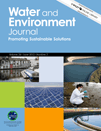
WATER AND ENVIRONMENT JOURNAL
Navigating the complexities of water and environmental issues.WATER AND ENVIRONMENT JOURNAL is a prominent interdisciplinary journal dedicated to the latest research and advancements in the fields of water resources, environmental engineering, and pollution management. Published by WILEY, the journal has established itself as an essential resource for academics, practitioners, and policymakers since its inception in 1987. With an impressive impact factor reflecting its robust influence, it ranks in the Q2 and Q3 quartiles across multiple categories, including Water Science and Technology, Environmental Engineering, and Management, Monitoring, Policy and Law. The journal welcomes high-quality research articles, reviews, and case studies that address the critical challenges facing water and environmental sciences. As an open access publication, it provides a platform for widespread accessibility and engagement, ensuring that the knowledge generated is disseminated to a diverse audience. With a commitment to advancing understanding and solutions in water-related issues, WATER AND ENVIRONMENT JOURNAL plays a crucial role in shaping the future of environmental research and technology.

International Journal of Built Environment and Sustainability
Fostering Knowledge for Sustainable Built EnvironmentsInternational Journal of Built Environment and Sustainability, published by PENERBIT UTM PRESS, serves as a pivotal platform for the dissemination of research in the fields of architecture, urban planning, and sustainable development. With an E-ISSN of 2289-8948 and having embraced Open Access since 2014, this journal ensures that critical findings in built environment research are accessible to a global audience, fostering innovation and collaboration among researchers, professionals, and students. Although the H-index and specific scope are currently not detailed, the journal's commitment to advancing sustainable practices in the built environment makes it an invaluable resource for those dedicated to tackling the pressing challenges of sustainability in our communities. As part of its mission, the journal prioritizes high-quality, peer-reviewed articles that contribute to both academic theory and practical applications, solidifying its role in shaping the future of our built environments.
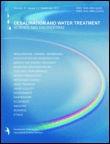
Desalination and Water Treatment
Transforming Water, Enriching LivesDesalination and Water Treatment is a pivotal journal in the realm of water science and technology, focusing on the critical issues surrounding water desalination and treatment processes. Published by DESALINATION PUBL in the United States, this journal, with ISSN 1944-3994 and E-ISSN 1944-3986, serves as an essential resource for researchers, professionals, and students engaged in ocean engineering, pollution control, and innovative water management strategies. With a transitional coverage from 2009 to 2024, it holds a respectable position in the third quartile of various categories, including Ocean Engineering, Pollution, and Water Science and Technology, as of 2023. The journal is indexed in Scopus, reflecting its contribution to the field by ranking within the 39th to 45th percentile across relevant subject areas. Although not an open-access publication, it remains a crucial platform for disseminating influential research, thereby enhancing the global repository of knowledge on water treatment methodologies and sustainable practices in desalination.

Water Resources and Industry
Transforming Research into Practical Water SolutionsWater Resources and Industry, published by Elsevier, stands at the forefront of research in the critical fields of water science and technology, as well as geography, planning, and development. With an impressive 2023 impact factor that places it in the Q1 category for both Geography and Water Science on a global scale, this journal is a vital resource for academics, professionals, and students seeking to advance their understanding of water-related issues impacting industries worldwide. Since its inception in 2013 as an Open Access journal, it has fostered innovative research and practical solutions to challenges in water resource management. Located in the vibrant academic hub of Amsterdam, the journal encourages submissions that cover a broad spectrum of topics, from sustainable practices and policy development to technological advancements in water treatment and distribution. By making its research publicly accessible, Water Resources and Industry not only contributes to scholarly discourse but also empowers stakeholders to implement evidence-based strategies for water sustainability, thereby enhancing its relevance and impact in today's world.

Water Conservation Science and Engineering
Fostering Collaboration for a Sustainable Water FutureWater Conservation Science and Engineering, published by SPRINGERNATURE, is a vital academic journal dedicated to advancing the fields of environmental engineering, ocean engineering, waste management, and water science and technology. Since its inception in 2016, the journal has quickly established itself within the academic community, achieving a commendable Q3 ranking across multiple categories in 2023. With an ISSN of 2366-3340 and an E-ISSN of 2364-5687, it is accessible to a global readership eager to explore the latest research and innovations in water conservation and sustainable practices. Although currently not open access, the journal is committed to publishing high-quality scholarly articles that provide insights into effective water management strategies, innovative engineering solutions, and the critical importance of preserving our water resources. Based in Singapore, Water Conservation Science and Engineering aims to foster interdisciplinary collaboration among researchers, professionals, and students, making it an essential resource for anyone passionate about environmental sustainability and preservation.
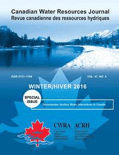
Canadian Water Resources Journal
Advancing sustainable solutions in water management.Canadian Water Resources Journal, published by Taylor & Francis Inc, is a leading academic journal dedicated to the field of water science and technology. With a significant history dating back to its inception in 1976, the journal offers a platform for high-quality, peer-reviewed research that addresses critical issues in water resources management, hydrology, water quality, and policy. The journal is recognized for its valuable contributions to the field, exemplified by its classification in the Q2 category for Water Science and Technology and holding a respectable rank of #137 out of 261 in the Scopus Environmental Science category. While it does not currently offer open access, its articles remain accessible through various institutional subscriptions, ensuring that professionals, researchers, and students stay updated with the latest advancements and discussions in water resources. As it converges towards its ongoing publication commitment through 2024, the Canadian Water Resources Journal remains an essential resource for those engaged in the pursuit of sustainable water management solutions.

Journal AWWA
Empowering Researchers and Professionals to Tackle Water Quality Issues.Journal AWWA, published by WILEY, serves as a vital platform in the fields of Chemistry and Water Science and Technology. Established in 1946 and with a rich history extending to 2024, this journal is dedicated to the dissemination of innovative research and practical insights that address the pressing challenges associated with water quality and management. Although currently not an open-access publication, it provides important contributions to a diverse audience, including researchers, industry professionals, and students dedicated to advancing knowledge in water sciences. With a respectable Q3 ranking in both the Chemistry and Water Science categories, as well as competitive Scopus rankings, Journal AWWA consistently delivers peer-reviewed articles that foster critical discussions and promote sustainable solutions within the community. The journal's commitment to excellence ensures that it remains a significant resource for those engaged in environmental science and technology.
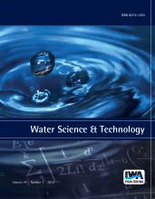
WATER SCIENCE AND TECHNOLOGY
Connecting knowledge and technology for sustainable water practices.WATER SCIENCE AND TECHNOLOGY, published by IWA PUBLISHING, is a leading academic journal dedicated to advancing the field of water science and technology. With a rich history dating back to 1970, the journal provides a platform for innovative research and technological advancements, catering to the vital challenges faced within the realms of environmental engineering and water resource management. As evidenced by its strong ranking in Scopus, where it holds a position of #86 in Water Science and Technology and #77 in Environmental Engineering, the journal exemplifies significant scholarly contributions, reflected in its Q2 quartile status in both categories as of 2023. Although not an open access journal, WATER SCIENCE AND TECHNOLOGY ensures that its articles are widely available to researchers, professionals, and students passionate about sustainable water solutions. With a continued commitment to excellence, this journal plays a crucial role in shaping the discourse surrounding water quality, conservation, and technology innovation, making it an essential resource for all stakeholders in this critical field.

Urban Water Journal
Empowering Policymakers with Cutting-Edge Water InsightsUrban Water Journal, published by TAYLOR & FRANCIS LTD, stands as an essential resource in the fields of Geography, Planning and Development and Water Science and Technology, reflecting its strong academic rigor and substantial contributions to urban water management and research since its inception in 2004. With an impressive impact factor indicated by its Q2 ranking in both disciplines, this journal serves as a vital platform for researchers, practitioners, and policymakers to disseminate and access pioneering studies and innovations related to urban water systems. The journal's focus extends to various aspects of urban water usage, sustainability, and policy-making, ensuring that readers are equipped with the latest findings that address pressing global challenges. Located in the United Kingdom, Urban Water Journal is committed to advancing knowledge in urban water resilience and sustainability, making it a crucial publication for those engaged in this dynamic and critical field. For researchers and professionals dedicated to impactful solutions in urban water management, this journal offers a comprehensive venue for sharing insights and fostering collaboration.